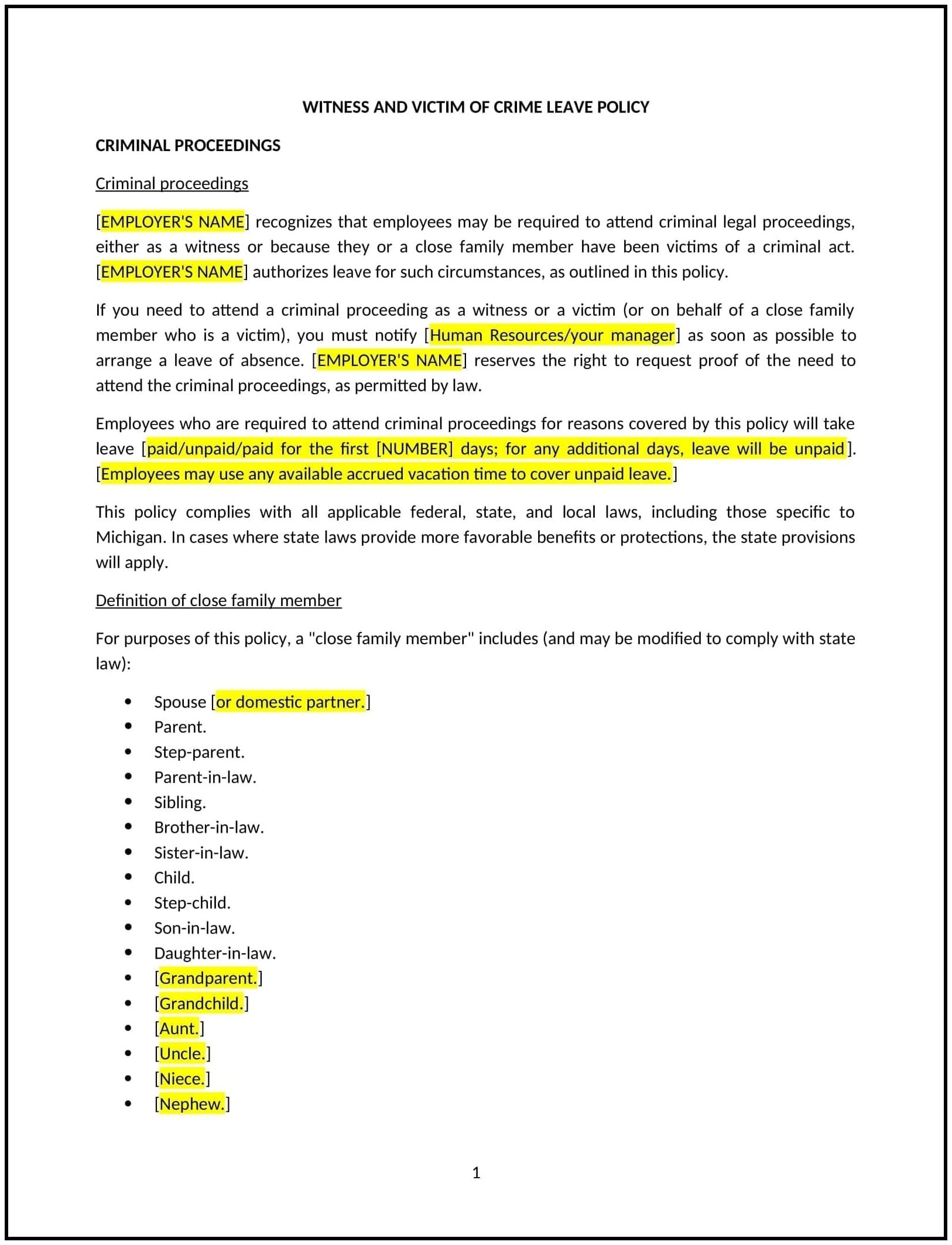Witness and victim of crime leave policy (Michigan): Free template
Got contracts to review? While you're here for policies, let Cobrief make contract review effortless—start your free review now.

Customize this template for free
Witness and victim of crime leave policy (Michigan)
A witness and victim of crime leave policy outlines the procedures and entitlements for employees in Michigan who need time off to participate in criminal investigations or proceedings, either as a witness or a victim of a crime. The policy provides clarity on how businesses handle leave for employees involved in legal proceedings, including the necessary documentation, eligibility criteria, and the duration of leave. This policy ensures that employees can fulfill their civic duties or recover from traumatic events without the fear of losing their job.
By implementing this policy, businesses can support employees who may need to take time off for legal matters, maintain compliance with Michigan state laws, and demonstrate compassion and responsibility toward employees' well-being.
How to use this witness and victim of crime leave policy (Michigan)
- Define eligibility for leave: Specify which employees are eligible for crime-related leave, such as full-time employees or those employed for a minimum period. The policy should outline the criteria for qualifying leave, including whether it applies to both victims and witnesses of crimes.
- Outline types of leave: The policy should detail the different types of leave available under this policy, such as paid or unpaid leave, and whether the leave is intended to cover attendance at court proceedings, providing victim statements, or other activities related to being a witness or victim of a crime.
- Specify the process for requesting leave: Define how employees should request leave, including the timeline for submitting leave requests, the required documentation (e.g., subpoenas, police reports), and who they should contact to initiate the leave process.
- Set limits on the duration of leave: Establish guidelines for how long employees can take leave, whether the leave is available per case or on an annual basis, and any limits on the duration of time that will be covered by paid leave.
- Provide guidance on job protection: Clarify that employees will not face job retaliation for taking crime leave, including ensuring that their position remains secure while they are absent. The policy should include protections against discrimination for those needing to take this type of leave.
- Address pay during leave: Specify whether the leave is paid or unpaid, and whether employees may use accrued paid time off (PTO) or vacation days during their absence.
- Define documentation requirements: Require employees to provide appropriate documentation, such as court orders or police reports, to substantiate their need for crime-related leave.
- Ensure compliance with Michigan state laws: The policy should comply with Michigan’s Crime Victim Rights Act and other applicable laws governing leave for victims and witnesses of crimes.
- Review and update regularly: Periodically review and update the policy to ensure it aligns with any changes to Michigan state laws or the evolving needs of the business and its employees.
Benefits of using this witness and victim of crime leave policy (Michigan)
This policy provides several key benefits for Michigan businesses:
- Supports employee well-being: Offering time off for employees involved in criminal investigations or proceedings demonstrates a commitment to supporting employees during difficult personal situations, such as trauma or legal obligations.
- Reduces stress and improves focus: By allowing employees to take time off for legal matters, businesses help reduce the stress that may come with managing legal obligations while balancing work responsibilities.
- Enhances employee loyalty: Providing leave for crime-related matters fosters trust and loyalty, as employees are more likely to appreciate an employer who shows empathy and supports them during challenging times.
- Ensures legal compliance: The policy helps ensure that the business complies with Michigan state laws governing leave for victims and witnesses of crimes, avoiding potential legal complications.
- Promotes fairness and equity: By providing a clear and structured process for requesting crime leave, businesses ensure that all employees are treated fairly and equally, without discrimination.
- Increases workplace safety and security: Offering leave to victims and witnesses allows employees to fully participate in legal proceedings, which can contribute to better outcomes for both the business and the community.
Tips for using this witness and victim of crime leave policy (Michigan)
- Communicate the policy clearly: Ensure all employees are aware of the witness and victim of crime leave policy by including it in the employee handbook, during onboarding, and in regular communications about employee benefits and rights.
- Train HR and managers: HR staff and managers should be trained to handle requests for crime leave professionally and empathetically, ensuring that employees feel supported during their time of need.
- Keep track of leave: Maintain accurate records of crime leave requests and usage to ensure compliance with the policy, and to track how much leave has been taken by each employee.
- Encourage timely reporting: Encourage employees to report their need for crime leave as soon as possible to allow adequate time for planning and coverage. Ensure the process for requesting leave is simple and efficient.
- Provide emotional support: In addition to offering time off, provide resources such as counseling or employee assistance programs (EAPs) to help employees cope with the emotional impact of being involved in criminal proceedings.
- Periodically review the policy: Regularly review the policy to ensure it remains up to date with changes to Michigan state laws and aligns with the business’s approach to employee welfare.